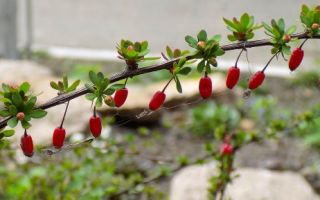Common barberry is a highly branched shrub with thorns, small oval leaves, height 1-2 m.
Content
Description and composition
The fruits are red oblong small sour berries. The fruits are collected in September-October, the roots in late autumn, the leaves in May-June, and the bark in early spring.
Barberry fruits contain
- sugar,
- organic acids - malic, citric, tartaric,
- choline-like dyes,
- mineral salts,
- vitamins.
Unripe fruits, leaves, roots and bark contain alkaloids:
- berberine,
- oxyacanthin,
- berbamine,
- Leontin and a number of others.
Vitamin E (tocopherol) and essential oil were found in the leaves during the fruiting period.
Application in medicine
Barberry has been used since ancient times; in ancient Babylon and India, its fruits were widely eaten and used as a diuretic and choleretic agent.
And now dried barberry fruits are a good addition to meat and other dishes, especially pilaf and rice dishes.
Fruit
Currently, the astringent and anti-inflammatory properties of the fruit are used
- as a remedy for diarrhea ,
- for hemorrhoids,
- to stimulate appetite,
- to reduce heat during febrile conditions,
- to stimulate appetite,
- as a diuretic,
- as improving blood circulation.
Roots
In folk medicine, a decoction of the root is used to treat
- stomach diseases,
- malaria,
- rheumatism,
- pleurisy,
- tuberculosis.
A decoction of flowers is used for heart disease and malaria.
The properties of the alkaloid berberine, which is found in the leaves and bark of the plant, have been well studied in medicine. Water and alcohol tinctures and other medications that are used in treatment are made from raw materials.
An alcoholic tincture of leaves has the following properties:
- improves intestinal activity,
- hemostatic,
- anti-inflammatory,
- constricts blood vessels,
- increases heart rate,
- lowers blood pressure,
- increases bile secretion.
How to use?
In some countries, a special barberry wine is made, which is used for constipation, headaches and to treat diphtheria.
Tincture of barberry leaves should be taken 26 drops 2-3 times a day for 2-3 weeks.
The bark tincture is prepared as follows:
1 teaspoon of dry barberry root bark is infused for 4 hours in 2 glasses of boiled water, filtered, and stored in a cool, dark place.
You need to drink in several sips throughout the day.
Contraindications
Barberry tincture is contraindicated for menopausal bleeding and retention of membranes and parts of the baby's place in the uterus.







